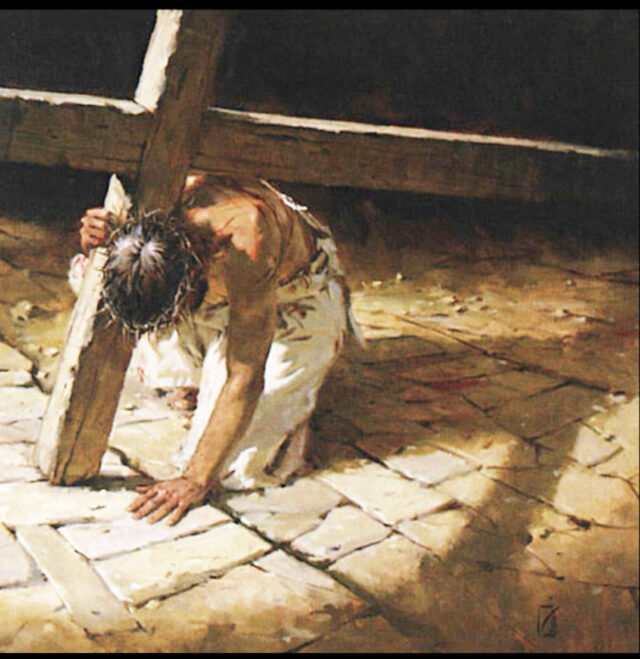Whereas the cross means different things to different people, to the religious it is a symbol of the suffering that Jesus Christ endured during His mission to redeem mankind.
Prophesying about His suffering, Isaiah 53:5 tell us: “But because of our sins He was wounded, beaten because of the evil we did.
We are healed by the punishment he suffered, made whole by the bows he received.”
This is an assurance that eve during difficult times like the current Coronavirus pandemic threatening the world, we should have hope because we are healed through His suffering.
Thus, we celebrate Easter in remembrance of His suffering and death on the Cross and resurrection. But the age-old question remains: whose Cross was/is it? Nathan Kiwere spoke to some individuals about the Cross.
There are few, if any, cinematic productions that depict the gruesome death of Jesus Christ like the 2004 blockbuster The Passion of the Christ by Hollywood maestro Mel Gibson.
The movie is a depiction of the last 12 hours in the life of Jesus of Nazareth, on the day of His crucifixion in Jerusalem.
While many reviewers admired aspects of the movie, majority agreed that Gibson had indulged violence, gore and horror.
David Denby, a critic with the New Yorker magazine, wrote then: “The movie Gibson has made from his personal obsessions is a sickening death trip, a grimly unilluminating procession of treachery, beatings, blood and agony…”
Meanwhile, some theological critics disproved Gibson’s opponents, saying that while the Bible may not paint the details of Jesus’s suffering on the Cross, it is possible that the enormity of punishment was much worse than portrayed in The Passion of the Christ.
In the midst of this paralysis of analysis, it is easy to miss the whole point of why Jesus allowed this suffering in the first place and, even more importantly, whose Cross it is that He carried. Was it His Cross or ours?
Then why was it necessary that He received help from a stranger to carry the Cross on the way to Calvary?
The Bible tells us that as they went out, they found a man of Cyrene, Simon by name. They compelled this man to carry His Cross, and he accepted (Matthew 27:32).
It is not to be overlooked that Simon carried Jesus’ Cross. Matthew and Mark clearly state the object Simon carried: “His [Jesus’] Cross.”
This might sound obvious, but it is profound that this man, Jesus, who all the Gospel writers clearly understand to be God incarnate, needs assistance at His moment of suffering.
Is God not the one who bears the suffering for us? Why, then, does He need the assistance of what seems to be a random man?
On the other hand, “carrying our cross” is a quite familiar concept to Christians.
We tend to associate this notion with physical ailments or challenges, difficulties in prayer, emotional distress, or any of a number of unwelcome events that inevitably occur in life.
Unwelcome as they are, if they cannot be eliminated or mitigated, they must be endured.
However, Jesus tells us in all three synoptic Gospels that carrying the Cross is the calling of all authentic followers of His, a cost of true discipleship. How we deal with our crosses, then, makes all the difference for us and for many persons with whom we associate.
We share the views of the different Christian leaders and their take about the cross and why it is crucial for our understanding of the Easter celebration.

Rev Can Dr Rebecca Nyegenye
At the moment Jesus Christ carried the cross, it was His because it is He that bore it.
But then the scriptures say that if we want to be followers of Christ, we have to daily carry our own crosses; but remember we have never invented our own crosses.
But I like the way His Grace the Archbishop Samuel Steven Kazimba Mugalu brought it out in his Easter message: “We carry our own crosses in our hearts…”
I have also been rethinking how best we can carry our crosses differently from the ecumenical perspective where people actually carry physical crosses and walk.
There is an interpretive dilemma; people need to understand that it is the spiritual cross referred to. Jesus carried the whole weight of the world on His cross.
Today we still carry burdens instead of taking them to the Cross of Jesus. Some people even find satisfaction in kneeling before the cross and cry out to Jesus, and I wouldn’t blame them for that.

Apostle Dr Sarah Bunjo, Christian Restoration Ministries International
Firstly, Jesus loved me before I loved Him. And because He desired to save me from eternal damnation, He carried the Cross, which makes it His Cross, since I could not have been part of that arrangement.
But again, because He did it for me and not for Himself, it implies that He carried my cross.
As a matter of fact, I am also a partaker in the carrying of the cross, when He says in Matthew 16:24: “Then Jesus told His disciples, ‘If anyone would come after me, let him deny himself and take up his cross and follow me’.”
The Cross means we are also partakers of the suffering of our Lord Jesus Christ. Thus if He paid the price, then shall we.
He states further in John 15:20: “Remember what I told you: ‘A servant is not greater than his master.’ If they persecuted me, they will persecute you also. If they obeyed my teaching, they will obey yours also.”

Tr Euphrasius Fuorr, Present Truth Ministries
Very simply put, the Cross Jesus carried was His Cross, but at the same time He did it on our behalf.
Jesus was sent to Earth to die for humanity. That represents His suffering and dying a death that was ordained by the Father.
2Corinthians 5:19-21 says: “That God was reconciling the world to himself in Christ, not counting people’s sins against them.
And He has committed to us the message of reconciliation. We are, therefore, Christ’s ambassadors as though God were making His appeal through us.
We implore you on Christ’s behalf: Be reconciled to God. God made Him who had no sin to be sin for us, so that in Him we might become the righteousness of God.”
This is where the cross Christ carried becomes ours because His body was broken and blood shed, just as He shared during the Last Supper. That means without the cross, there is no redemption for mankind.

Pr Esther Kintu, House of Revival Church
Jesus carried the Cross for my sake. At that point when Jesus was given the cross, it was His Cross but symbolically it was our Cross.
Being hanged on the Cross was a curse during the Roman reign, which is exactly what Jesus became.
It was on that basis that He was able to stand before God and plead on our behalf because this was the only legal transaction that God would accept – a man that knew no sin to become sin (not a sinner) to be condemned.
That means He had to become everything we were (sin) so that we could take on His righteousness and become children of God. In that sense, the cross was certainly for us as much as it was for Him.

Pr Hope Bongole
First of all, we have to understand what happened. There was an exchange of natures at the Cross. It was at the Cross that He said, “It is finished,” and the church was established.
He took on the nature of man and became sin and went to hades and now we who had the sinful nature are free.
We were sinners not because of what we had done, but according to Adam’s fall [disobedience].
Jesus carried His own Cross and this was because He cried out: “My Father, my Father, why have you forsaken me?”
Because He felt the weight of the Cross… But in inference, He carried the Cross for the whole world. The purpose of the cross was for us to receive eternal life.
You can’t talk about the Cross without reference to His death, resurrection, ascension and enthronement.
It says we are seated in heavenly places with Christ at the right hand side of the Father, in places of authority.






















